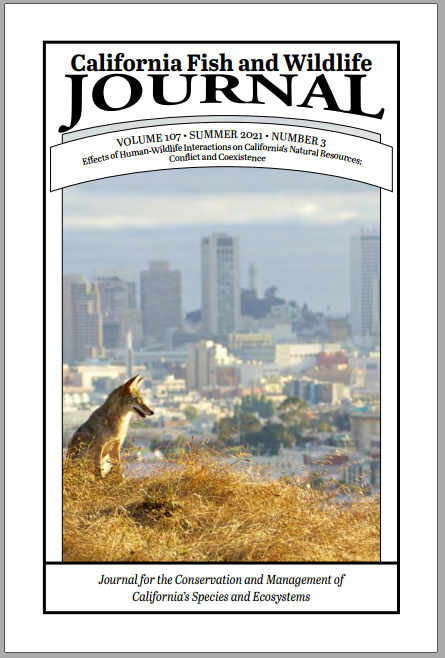The California Fish and Wildlife Journal concludes its 2021 Special Issue installments with the winter quarter’s Special Issue: Effects of Human-Wildlife Interactions on California’s Natural Resources: Conflict and Coexistence (PDF). With this year’s unprecedented drought, unpredictable fire season, climate change, pandemic response, and increased human-wildlife conflict reported statewide, issue 107-3 is salient and timely. In this Special Issue, we explore various interconnected themes across four sections: Terrestrial Predator Interactions, Conflicts & Adaptive Management, Coexistence & Conservation, and the Human Dimensions of Wildlife Conservation.

The California Department of Fish and Wildlife (CDFW) serves as the lead state agency charged with helping to resolve human-wildlife conflict, public safety, and reported depredation (property damage) and committed to advancing discussion and deeper understanding of human-wildlife interactions throughout the state. People live increasingly in close contact with animals, both wild and domestic, as the human population expands along the wildland-urban interface and increases over time. This reality has led to increased human-wildlife interactions and reported human-wildlife conflict. Negative human-wildlife interactions can directly affect human and wildlife health and may result in loss of livelihood, reduced wellbeing, or in some instances, loss of life – animal or human.
Come read about the various types of human-wildlife interaction, some of the unique challenges – and opportunity – to better address understand and address human-wildlife conflict. Various agency partners, practitioners, researchers, and key stakeholders have contributed their expertise to this Special Issue. We hope you recognize the myriad factors that can shape our perception and approach to wildlife in California. Learn more!
The California Fish and Wildlife Journal has published high-quality, peer-reviewed science for more than 100 years – and the CDFW looks forward to more valuable contributions ahead.
###